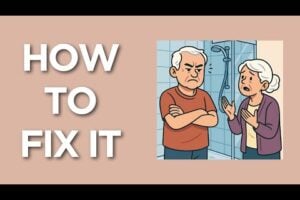AGITATION & ANXIETY IN ALZHEIMER’S:
Get these tips for coping with “sundowning”. (Sundowning is restlessness or agitation in the late afternoon or early evening in Alzheimer’s.)
Late afternoon and early evening can be difficult for some people with Alzheimer’s disease. They may experience sundowning (restlessness, agitation, irritability, or confusion that can begin or worsen as daylight begins to fade) often just when tired caregivers need a break.
Sundowning can continue into the night, making it hard for people with Alzheimer’s to fall asleep and stay in bed. As a result, they and their caregivers may have trouble getting enough sleep and functioning well during the day.
Possible Causes
The causes of sundowning are not well understood. One possibility is that Alzheimer’s-related brain changes can affect a person’s “biological clock,” leading to confused
sleep-wake cycles. This may result in agitation
and other sundowning behaviors.
Other possible causes of sundowning include:
- being overly tired
- unmet needs such as hunger or thirst
- depression
- pain
- boredom
Coping with Sundowning
Look for signs of sundowning in the late afternoon and early evening. These signs may include increased confusion or anxiety and behaviors such as pacing, wandering, or yelling. If you can, try to find the cause of the person’s behavior.
If the person with Alzheimer’s becomes agitated, listen calmly to his or her concerns and frustrations. Try to reassure the person that everything is OK and distract him or her from stressful or upsetting events.
You can also try these tips:
- Reduce noise, clutter, or the number of people in the room.
- Try to distract the person with a favorite snack, object, or activity. For example, offer a drink, suggest a simple task like folding towels, or turn on a familiar TV show (but not the news or other shows that might be upsetting).
-
Make early evening a quiet time of
day. You might play soothing music,
read, or go for a walk. You could also
have a family member or friend call
during this time. - Close the curtains or blinds at dusk to
minimize shadows and the confusion
they may cause. Turn on lights to help
minimize shadows.
Preventing Sundowning
Being too tired can increase late-
afternoon and early-evening
restlessness. Try to avoid this situation
by helping the person:
- go outside or at least sit by the window—exposure to bright light can help “reset the person’s body clock”
- get physical activity or exercise each day
- get daytime rest if needed, but keep naps short and not too late in the day
- get enough rest at night
Avoid things that seem to make sundowning worse:
- Do not serve coffee, cola, or other drinks with caffeine late in the day.
- Do not serve alcoholic drinks. They may add to confusion and anxiety.
- Do not plan too many activities during the day. A full schedule can be tiring.
If Problems Persist
If sundowning continues to be a problem, seek medical advice. A medical exam may
identify the cause of sundowning, such as pain, a sleep disorder or other illness, or a
medication side effect.
If medication is prescribed to help the person relax and sleep better at night, be sure to find
out about possible side effects. Some medications can increase
the chances of dizziness,
falls, and confusion. Doctors recommend using them only for short periods of time.
SOURCE:
The Alzheimer’s Disease Education and Referral (ADEAR) Center is a service of the National Institute on Aging,
part of the National Institutes of Health. The Center offers information and publications for families, caregivers,
and professionals about Alzheimer’s disease and age-related cognitive changes.












My mom has very little short term memory. She also has an inability to concentrate, so can't follow TV shows, can't read anymore (though she used to love reading), can't play favourite games, can't remember how to cook or "keep house". She is uninterested in crafts and her lack of manual dexterity prevents her from painting, which she did for 45 years. She finds it too painful to listen to music because it seems to remind her of my dad, who passed in 2013. She suffers from sundowning – antidepressants and sleep meds have helped some, but nothing seems to relieve the boredom and total dependence on my sister, her caregiver. We are hoping to get her into LTC before she is beyond the ability to adapt, but the pandemic and a years' long waitlist render this an indefinite possibility. We are tired and frustrated and feel hopeless. Doctors have not been able to tell us what kind of dementia she has, or how long the progression might be. She is our mother, we love her and we want her to be happy. But she is no longer our mother, and we feel guilty because we want her to be at rest.
I was diagnosed with Alzheimer's 3 years ago. I feel fine during the day, and anxious, scared, and cry a lot when evening comes. From what I've read I realized that this is "sundowning". What helps me is all the lights are on in the house when I'm awake and it's evening. I shut all the blinds so I can't see outside. Music helps and so does getting immersed in an activity. I knit while I watch TV. Recently I've tried marijuna in vapor form. I was reluctant to try it but just one inhaling helps tremendously. It's legal in our state.
Need info when speech is not understandable, words all mixed up both when hearing & speaking.
In the late stages of dementia you look to long term memory because typically short term memory is not reliable or gone completely. The evidence-based interventions that work best include validation, sensory, reminisce and possibly Montessori. Validation means always letting them know they are right, even if they don't seem to be listening, let them know they are smart and right about whatever they said. Sensory is something as simple as taking the person outdoors and feeling the cold or warmth, smelling vanilla, rose, apple pie, or some smell that might spark a happy memory. Music often stirs long term memory, of barn dances, or Louis Armstrong, or gospel music…whatever music the person likes. Try putting on music from the person's past. Reminisce is using the person's long term memory. When a person doesn't have short term memory anymore, the world they wake up in everyday is one from somewhere in the past because that's what they do remember (long term memory). Image if you don't have short term memory and don't recall that you're married, or have children, or what you had for breakfast. You would wake up in whatever memory you have, and this is typically long term memory, and sometimes this is really far back. Long term memory is stored in a different place in our brains than short term memory, so when short term memory is gone, they usually still have long term memory, so the person usually still has these memories of childhood, or teenage years or early marriage or work they used to do. And then there's Montessori, or in other words, activities. But you have to look to the past to find out what the person used to like to do, such as cards, checkers, dominoes, wood working (sanding a piece of wood is great for recalling this type of activity), and there are so many others. But the one your loved one will engage in is the one that has meaning and purpose. And completion of the activity is not the goal, the goal is to engage your loved one in something with meaning and purpose. You just have to figure it out. One time it took me two weeks working with a patient with dementia to figure out that she loved painting. Another man used to have a shoe repair shop. One woman was a florist for 30 years…. Your loved one with dementia is lucky to have you.
They actually do not have short term memory and that is the challenge.
Evidence based says in later stages people live in the present through the memories of the past so good to get to know the person from the outset from them to help us help them.
I work with dementia and alzheimers and how you are saying do things with the residents I have its impossible to do the tasks you put across
Our residents have no conversation we talk to them but they dont understand we do the best we can. They dont want to join in on things yet your page always says let them do certain things .I think you are talking about first stages …not cases like we have ..I would like to see more about the later cases and what we can do to get them to enjoy themselves….They only have a short memory
Yes I would like information about this too. My sister is at this stage.
I see this with my father, he wakes up in the morning confused, doesn't know my mother, he speaks but the words are not sentences, sometimes he is able to say exactly the words he wants and means. When he can't get the right word or is confused, trying to reassure him that it's OK only agitates him more.
Yes, my father is at this stage. He can bearly walks let alone play a game. He doesn`t sleep well at night has restless leg symode. He has a sleeping pill but usually takes naps during the day. Keep me informed if someone else come up.
my mom has this trouble. Doctor did'n't know what to do about it except give her sleeping pills that really didn't work. Now at night we give her Tylenol pm and it works a lot better. she still has nights where this does't work and she wants to continually go to the bathroom or walk around, but it has helped a lot ad with no narcotics.
I suggest asking your physician about using Melatonin. A natural supplement. Melatonin is produced in the brain naturally, and aids in sleep. As we age, melatonin is depleted. It is generally regarded as safe. My MD recommended it to me for my own sleep problems and I find that it works well. Suggest a routine for quiet time, relaxing and a good foot rub with lotion (there is an accupressure point in the bottom of our feet that soothes anxiety and calms the nervous system. Do both feet for a few minutes each after the Melatonin).
wife gets edgy always aroud 1730 1830.
So does my husband..to the point it's exhausting.